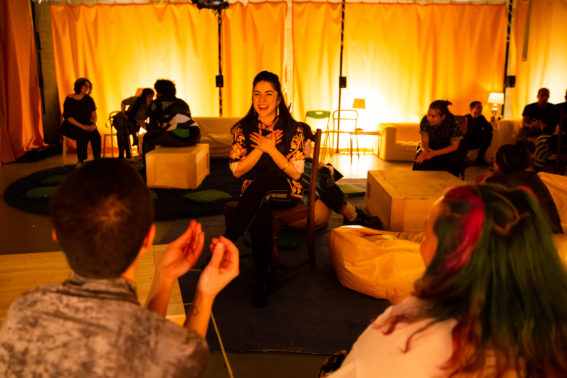********
Last season you joined us for Pay No Attention to the Girl, our production exploring multiple stories from The One Thousand and One Nights. We’re so happy to have you back for ‘MARJANA’, which is a different kind of animal, with a different process and also different story. What expectations did you have going into the production?
In this process, I have strived to avoid expectation and to embrace possibility, because I have learned that one of the many wonders of working with Target Margin is that anything, and seemingly everything, is possible. And though the story of Marjana is at the heart of the work, we are sharing three stories (at least!). It feels impossible to disentangle the tales and isolate one; they are so intricately and vitally interwoven. For me, honoring the text and its history demands that we share multiple stories, and I am grateful that the exploration and sharing continues to center women.
Pay No Attention to the Girl was unconventional in many ways–what can audiences expect this time around? What are you excited about most about sharing with the audience?
Audiences can expect the most amazing electric neon tent they ever did see, the hippest jams, a prop extravaganza, runway-worthy costumes – basically, a sumptuous feast of design courtesy of geniuses Carolyn, Cheyenne, Eamon, David, Dina, Ana-Sofia, and Kate. Folks can also expect to experience a new set of stories told in a couple of different ways distinct from the ways in which we were working in Pay No Attention to the Girl. And, of course, each night I look forward to being in the room with the luminous Anish, Sophie, Anthony, Isuri, Grace, Brie, Michelle, and Eamon.
I am also looking forward to sharing with the audience a bit about how the orphan stories originated. I am so drawn to the long and rich history (and mystery) of these stories. To themes of translation and transmission – what is lost, gained, appropriated, altered; the way we remember things; the way we forget; xenophobia; orientalism. Working with The Nights has led me to become interested, especially, in questions of authenticity and truth. I am excited about the space this performance makes to acknowledge some of the lesser known authors.
‘MARJANA’ is adapted from the tale of Ali Baba, but the production is telling the story from Marjana’s perspective. What compels you the most about the character of Marjana?
The story and character of Marjana are profoundly complex, like The Nights. Putting this particular story and a woman (who is also a slave) at the center of the work has challenged me to think deeply about questions of justice, power, sexual politics, gender, the danger of women, and to wrestle with the moral ambiguity of The Nights and its existence as a pre-psychology text. Inspired by the many brilliant artists collaborating on this story, I have been thinking a lot about violence, more specifically, the violent potential of this woman and violence’s role within The Nights as a whole.
What does this story mean to you? And how does this production fulfill your artistic endeavors?
Working on this material at Target Margin has been and continues to be one of the greatest privileges of my life. Working with David and team Marjana is a dream. Our histories are highly diverse and we work in so many different ways, but we are unfailingly collaborative, generous, fierce, and silly, and that brings me A LOT of joy. One of the most challenging and exhilarating things about this production in particular for me has been the way it has asked us to engage with dark content in light ways. And, of course, I am grateful to this work for continuing to remind me of the seriously high stakes of storytelling – in The Nights and in this moment in history.
What’s next for you after MARJANA AND THE FORTY THIEVES?
I am really looking forward to reuniting with the Pay No Attention to the Girl team for performances at the Spoleto Festival in June. And I am very excited to be headed to The Crosscurrents Festival in DC in May with the Lab for Global Performance and Politics Fellows and my theater company LubDub Theatre’s new play-in-development A Play for the Living in a Time of Extinction by Miranda Rose Hall.
********
Caitlin Nasema Cassidy is an actor-singer-theatremaker of Lebanese and Irish descent, who is over the moon to be returning to The Thousand and One Nights with TMT. She is a Fellow with the Lab for Global Performance and Politics and with the Edinburgh Institute for International Affairs. She is Co-Artistic Director of LubDub Theatre Company. Acting Credits include: Heartland (New Rep, Bridget O’Leary), Paradise (CST, Shana Gozansky – 2018 Elliot Norton Award), Middle East Mix Fest (Atlantic Theatre, Kareem Fahmy), Cymbeline (Shakespeare’s Globe, Tom Cornford),Anything Goes (Williamstown, Roger Rees), and Kafka’s Metamorphosis (Synetic Theater Company). CaitlinNCassidy.com
